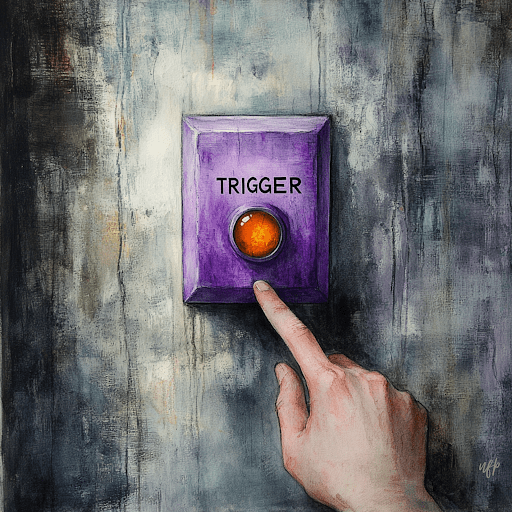
You Weren’t Overreacting. You Were Triggered.
That moment felt bigger than it should’ve.
A silence that stretched too long.
A message left unread.
A shift in someone’s tone.
Suddenly, your thoughts are racing and your peace feels out of reach.
You might assume you’re being “too sensitive.”
But let me offer a better explanation:
You’re not broken. You were triggered.
And the trigger? That’s not the real problem.
The Trigger vs The Cause
A trigger is something that activates a strong emotional response.
It’s the thing that pushes a button—but it didn’t install the button in the first place.
Triggers can be subtle:
• A passive-aggressive comment
• Being left out of the group chat
• A tone that reminds you of someone else
But the trigger is just the spark.
The real fire is coming from something deeper.
That’s the cause. The hidden root that’s been quietly shaping your reactions for years.
What’s Really Causing the Spiral?
Behind the urge to fix, explain, shrink, or prove yourself…
There’s usually a story.
Many women, especially those of us raised in church culture, carry silent histories shaped by:
• Emotional neglect
• Conditional love
• Environments where speaking up felt unsafe
• Repeated experiences of rejection or dismissal
• Misunderstood teachings about humility and sacrifice
From those environments, we form internal scripts:
• “If I disappoint them, I’ll lose their love.”
• “If I make a mistake, I’ll be rejected.”
• “It’s my job to keep everyone comfortable.”
But these aren’t just thoughts. They’re survival patterns we learned to stay connected.
And now?
They’re showing up as triggers.
God Doesn’t Want You Living on Edge
Let’s be clear:
Faith isn’t about pretending you’re not triggered.
It’s about being honest about what hurts—and inviting God into it.
Galatians 1:10 (ESV) says:
“Am I now trying to win the approval of man, or of God?… If I were still trying to please man, I would not be a servant of Christ.”
You weren’t made to live at the mercy of other people’s responses.
You were created for wholeness, not hypervigilance.
Grow Through It: A Truth-Based Response Framework
Here’s a simple framework to help you respond to triggers without getting trapped in them:
1. Pause.
Take a breath. Triggers create urgency, but healing is patient.
2. Name the trigger.
What just happened? What stirred something in you?
3. Feel the emotion.
Is it anxiety? Rejection? Shame? Notice it—don’t judge it.
4. Trace the connection.
What memory or belief is this moment echoing?
5. Replace the script.
Speak truth over the cause:
• “I’m not responsible for everyone’s emotions.”
• “My value isn’t based on other people’s opinions.”
• “God calls me loved, not based on my performance.”
Seed to Sow This Week
Scripture:
“The fear of man lays a snare, but whoever trusts in the Lord is safe.” — Proverbs 29:25
Reflection:
• What’s one trigger that consistently knocks you off center?
• What belief might be buried underneath that moment?
Affirmation:
I am not broken. I am unfolding.
I release the need to perform for love.
I am rooted in God’s truth, not people’s opinions.
The Bottom Line
Triggers may set off the alarm, but they don’t tell the full story.
Healing happens when you stop reacting to the surface and start tending to the root.



